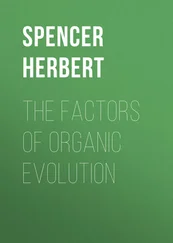[3]For detailed proof of these assertions see essay on "Manners and Fashion."
[4]The argument concerning organic evolution contained in this paragraph and the one preceding it, stands verbatim as it did when first published in the Westminster Review for April, 1857. I have thus left it without the alteration of a word that it may show the view I then held concerning the origin of species. The sole cause recognized is that of direct adaptation of constitution to conditions consequent on inheritance of the modifications of structure resulting from use and disuse. There is no recognition of that further cause disclosed in Mr. Darwin's work, published two and a half years later—the indirect adaptation resulting from the natural selection of favourable variations. The multiplication of effects is, however, equally illustrated in whatever way the adaptation to changing conditions is effected, or if it is effected in both ways, as I hold. I may add that there is indicated the view that the succession of organic forms is not serial but proceeds by perpetual divergence and re-divergence—that there has been a continual "divergence of many races from one race": each species being a "root" from which several other species branch out; and the growth of a tree being thus the implied symbol.
[5]"Personal Narrative of the Origin of the Caoutchouc, or India-Rubber Manufacture in England." By Thomas Hancock.
TRANSCENDENTAL PHYSIOLOGY.
Table of Contents
[ First published in The National Review for October, 1857 , under the title of "The Ultimate Laws of Physiology". The title "Transcendental Physiology", which the editor did not approve, was restored when the essay was re-published with others in 1857.]
The title Transcendental Anatomy is used to distinguish that division of biological science which treats, not of the structures of individual organisms considered separately, but of the general principles of structure common to vast and varied groups of organisms—the unity of plan discernible throughout multitudinous species, genera, and orders, which differ widely in appearance. And here, under the head of Transcendental Physiology, we purpose putting together sundry laws of development and function which hold not of particular kinds or classes of organisms, but of all organisms: laws, some of which have not, we believe, been hitherto enunciated.
By way of unobtrusively introducing the general reader to biological truths of this class, let us begin by noticing one or two with which he is familiar. Take first, the relation between the activity of an organ and its growth. This is a universal relation. It holds, not only of a bone, a muscle, a nerve, an organ of sense, a mental faculty; but of every gland, every viscus, every element of the body. It is seen, not in man only, but in each animal which affords us adequate opportunity of tracing it. Always providing that the performance of function is not so excessive as to produce disorder, or to exceed the repairing powers either of the system at large or of the particular agencies by which nutriment is brought to the organ—always providing this, it is a law of organized bodies that, other things equal, development varies as function. On this law are based all maxims and methods of right education, intellectual, moral, and physical; and when statesmen are wise enough to see it, this law will be found to underlie all right legislation.
Another truth co-extensive with the organic world, is that of hereditary transmission. It is not, as commonly supposed, that hereditary transmission is exemplified merely in re-appearance of the family peculiarities displayed by immediate or remote progenitors. Nor does the law of hereditary transmission comprehend only such more general facts as that modified plants or animals become the parents of permanent varieties; and that new kinds of potatoes, new breeds of sheep, new races of men, have been thus originated. These are but minor exemplifications of the law. Understood in its entirety, the law is that each plant or animal produces others of like kind with itself: the likeness of kind consisting not so much in the repetition of individual traits as in the assumption of the same general structure. This truth has been made by daily illustration so familiar as nearly to have lost its significance. That wheat produces wheat—that existing oxen are descended from ancestral oxen—that every unfolding organism ultimately takes the form of the class, order, genus, and species from which it sprang; is a fact which, by force of repetition, has assumed in our minds the character of a necessity. It is in this, however, that the law of hereditary transmission is principally displayed; the phenomena commonly named as exemplifying it being quite subordinate manifestations. And the law, as thus understood, is universal. Not forgetting the apparent, but only apparent, exceptions presented by the strange class of phenomena known as "alternate generation," the truth that like produces like is common to all types of organisms.
Let us take next a universal physiological law of a less conspicuous kind. To the ordinary observer, it seems that the multiplication of organisms proceeds in various ways. He sees that the young of the higher animals when born resemble their parents; that birds lay eggs, which they foster and hatch; that fish deposit spawn and leave it. Among plants, he finds that while in some cases new individuals grow from seeds only, in other cases they also grow from tubers; that by certain plants layers are sent out, take root, and develop new individuals; and that many plants can be reproduced from cuttings. Further, in the mould that quickly covers stale food, and the infusoria that soon swarm in water exposed to air and light, he sees a mode of generation which, seeming inexplicable, he is apt to consider "spontaneous." The reader of popular science thinks the modes of reproduction still more various. He learns that whole tribes of creatures multiply by gemmation—by a development from the body of the parent of buds which, after unfolding into the parental form, separate and lead independent lives. Concerning microscopic forms of both animal and vegetal life, he reads that the ordinary mode of multiplication is by spontaneous fission—a splitting up of the original individual into two or more individuals, which by and by severally repeat the process. Still more remarkable are the cases in which, as in the Aphis , an egg gives rise to an imperfect female, from which other imperfect females are born viviparously, grow, and in their turns bear other imperfect females; and so on for eight, ten, or more generations, until finally, perfect males and females are viviparously produced. But now under all these, and many more, modified modes of multiplication, the physiologist finds complete uniformity. The starting-point, not only of every higher animal or plant, but of every clan of organisms which by fission or gemmation have sprung from a single organism, is always a spore, seed, or ovum. The millions of infusoria or of aphides which, by sub-division or gemmation, have proceeded from one individual; the countless plants which have been successively propagated from one original plant by cuttings or tubers; are, in common with the highest creature, primarily descended from a fertilized germ. And in all cases—in the humblest alga as in the oak, in the protozoon as in the mammal—this fertilized germ results from the union of the contents of two cells. Whether, as among the lowest forms of life, these two cells are seemingly identical in nature; or whether, as among higher forms, they are distinguishable into sperm-cell and germ-cell; it remains throughout true that from their combination results the mass out of which is evolved a new organism or new series of organisms. That this law is without exception we are not prepared to say; for in the case of the Aphis certain experiments are thought to imply that under special conditions the descendants of an original individual may continue multiplying for ever, without further fecundation. But we know of no case where it actually is so; for although there are certain plants of which the seeds have never been seen, it is more probable that our observations are in fault than that these plants are exceptions. And until we find undoubted exceptions, the above-stated induction must stand. Here, then, we have another of the truths of Transcendental Physiology: a truth which, so far as we know, transcends all distinctions of genus, order, class, kingdom, and applies to every living thing.
Читать дальше












